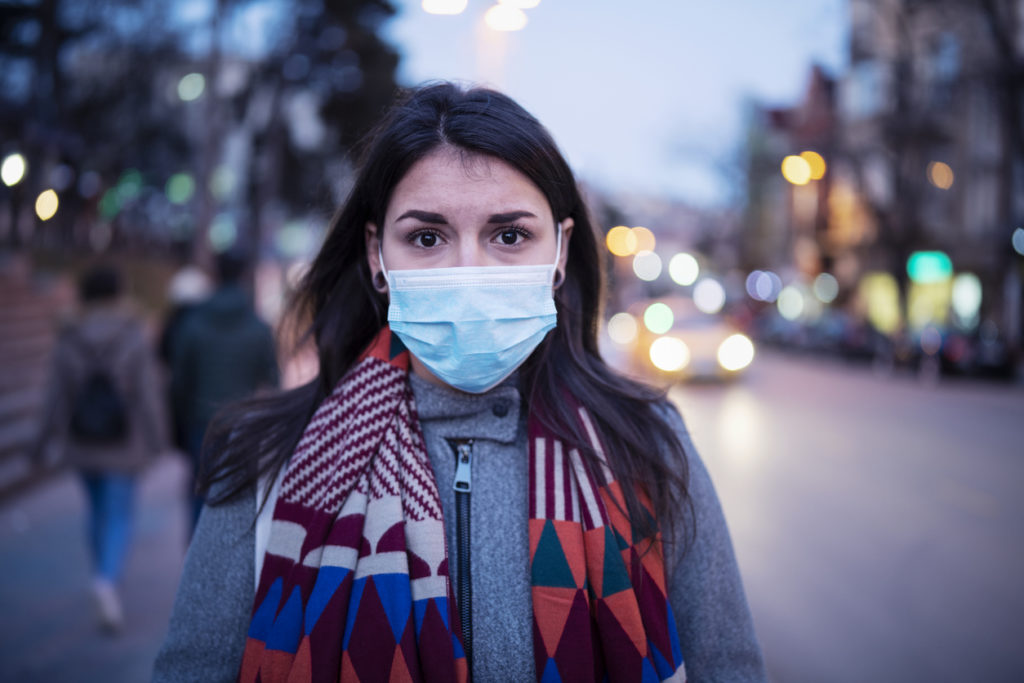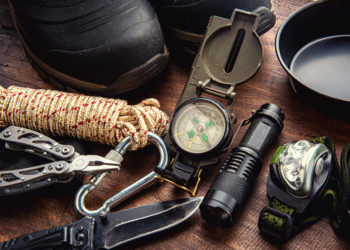Continuing on from yesterday’s post:
With life changing so dramatically, so quickly, and for such a large portion of the global population, people are developing new habits, new practices, and new methods of managing their lives and our current situation. We at The Scholarly Kitchen recognize that there are many people around the world dealing with losses of family, friends, and income. There are also those in essential industries that are risking their lives to keep our respective countries going. We feel great sadness and regret for those experiencing loss and an inability to fully express our gratitude to those in essential roles.
We also feel it’s important to recognize that this sudden change in how we conduct our lives, combined with uncertainty about the future, is a source of anxiety and grief for almost everyone. We all manage that in different ways.
From binge watching Netflix, binge listening to audiobooks and podcasts, reconnecting with neighbors and old friends, Zoom happy hours or Zoom family game nights, to cooking, exercising, and gardening, we’re all figuring out how to get through our days and be productive in the new normal. Thanks to Charlie Rapple, some of us have a new game as well!
So this month we asked the Chefs: What are you doing that helps you get through your day? Below find our second set of answers, and yesterday’s can be found in Part 1.

Todd Carpenter: Before we begin, let’s start with the preface: Many people’s situations are much more challenging and difficult than my own. My heart goes out to those millions of people who have been laid off or have been furloughed. Most of NISO’s work can primarily be accomplished virtually, so as long as volunteers can spend the time engaging with our work, contributing their ideas, and reading or writing standards or recommendations, we can continue our work. Seemingly, and this may just be for those leading or managing teams, the shift we have experienced over the past six weeks has created a more stressful and busy period in many ways.
The one thing that has been keeping me sane, if only partially, is running.
The one thing that has been keeping me sane, if only partially, is running. I started running about 8 years ago, primarily because I realized that I needed to be faster than my son, at least over short distances. The funny thing is now that I’ve switched to being faster, but now over longer distances!
Getting out the door and traversing even the next few neighborhoods over from my own gives me the slightest sense of normalcy. Previously, I had listened to a series of current-events, political and technology podcasts to keep my mind occupied for the 30-45 minute daily run. Now I’m regularly going for about an hour, but I’ve had to switch up my podcasts, since they are all-COVID-all-the-time. I’ve switched to audiobooks, which are blessedly not about the pandemic. Even as the pollen counts have picked up and my seasonal allergies begin to kick in, being outside, even in the mornings before most of the rest of the world is awake, gives me a sense the world is still moving outside my home, albeit at a much slower pace. It gives me a break from the pull of the laptop, and the work that goes on now nearly 24 hours per day, and the demands of homeschooling, and navigating all those things that used to be easy but now seem to take hours, like groceries or communicating with family.
Sian Harris: I am fortunate in two main ways. First, I have worked from home for over a decade when my children were younger, so I’m accustomed to this way of working. I’ve concluded that different people find different approaches that work for them. Many people swear by the importance of sticking to really clear times for work and not-work but I’m the opposite. I find a real strength of working from home is that I can perhaps start work early, take a break to put some laundry on mid-morning, take a lunch break that is long enough to have a walk or do some shopping, maybe work from a café in the afternoon for a change of scene and then finish off a bit of work late at night when everything is quiet and I can revisit something I was struggling with the headspace for earlier in the day.
Second, I’m fortunate as this kind of flexibility and a culture of remote working is already embedded in how we work at INASP. Given the nature of our work (in international development), it is usual for staff and partners to be dialing into meetings from a different time zone and to work around intermittent internet connections. Skype, Zoom, Slack, and Microsoft Teams, social media and sharing online learning with each other have been part of my daily workflow for a long time.
Working at home during this pandemic is, of course, a bit different. The normal things we do for a change of scene are no longer possible and the whole family is at home with different work schedules, which can bring some unexpected interruptions (such as needing to turn off a smoke alarm while dialing into a staff meeting!). But the removal of many of the normal distractions also frees up time.
The biggest positive change that I’ve found is having the opportunity to be in more frequent and deeper contact with family, friends and neighbors.
The biggest positive change that I’ve found is having the opportunity to be in more frequent and deeper contact with family, friends and neighbors. Nobody is going out these days so instead of that face-to-face get together that we never manage to find a date for, I can simply share a zoom link and old friends are free to show up to have a drink and a chat together.
Similarly, if I go out for a midday walk, I sometimes use the time to phone a friend. At the weekends I have high ambitions for decluttering and catching up on all those jobs that get put off in the busyness of life. Currently those tasks are still mainly in the future tense but, in the meantime I’m using Duolingo to learn Welsh, catching up on television programs I’ve been too busy to watch and, if our recycling bin is to be believed, perhaps enjoying a bit more wine than I usually would!
David Crotty: One of the surprising struggles that I’ve had is the opposite of isolation – it’s been hard work to find quiet downtime in a house that is now constantly full, all day, every day. The concept an “introvert” describes someone for whom interacting with others is energy draining, rather than causing the enervation that extroverts feel. Introverts require periods of solitary reflection to replenish those energy supplies. Finding those times can be difficult if you’re never alone. So one of the things that’s been helping is carving out time for solo activities that are re-energizing.
Much of that time has been spent reading, and on that subject, I think it’s worth mentioning the value of escapism. I’ll let author Neil Gaiman explain, as he put it better than I ever could:
“I’d like to say a few words about escapism. I hear the term bandied about as if it’s a bad thing. As if “escapist” fiction is a cheap opiate used by the muddled and the foolish and the deluded, and the only fiction that is worthy, for adults or for children, is mimetic fiction, mirroring the worst of the world the reader finds herself in.
If you were trapped in an impossible situation, in an unpleasant place, with people who meant you ill, and someone offered you a temporary escape, why wouldn’t you take it? And escapist fiction is just that: fiction that opens a door, shows the sunlight outside, gives you a place to go where you are in control, are with people you want to be with (and books are real places, make no mistake about that); and more importantly, during your escape, books can also give you knowledge about the world and your predicament, give you weapons, give you armour: real things you can take back into your prison. Skills and knowledge and tools you can use to escape for real.
As JRR Tolkien reminded us, the only people who inveigh against escape are jailers.”
For me escape has meant alternating between space operas and books about musical history. The allure of outer space adventures should be obvious given our current confinement, and I can recommend both Gareth Powell’s Embers of War series and Ann Leckie’s Ancillary series, both thoughtful explorations of the nature of personhood without scrimping on the galactic action. It’s also fascinating to be of an age where the musicians that you grew up seeing in bars are now all writing biographies. This is another form of escapism, looking back into a simpler time. Liz Phair’s Horror Stories was somewhat disappointing, presenting a series of essays on her emotional state throughout different periods of her life, with little mention of her music or career. Having seen a painfully nervous early performance by Phair at CBGB’s, it would have been interesting to read more about her growth as an artist. More enjoyable was More Fun In The New World, John Doe’s follow-up collection to Under The Big Black Sun. Where Sun was a bit insular and precious in describing the LA punk scene, New World is expansive, as the LA scene fell apart and went in different directions, from the Paisley Underground to Cowpunk (which led to alt.country, which now seems to be called “Americana”). I’m next looking forward to Cool Town, a history of the Athens, GA music scene just published by the University of North Carolina Press.
And please, if you are reading, consider ordering books from your local bookstore rather than putting more money in Amazon’s overflowing bank accounts. Most bookstores have moved online, and though it may cost you a little more, it’s worth paying extra in hope that we’ll still have bookstores to visit when all of this passes. If you don’t have a local bookstore, you can find an independent shop to support through IndieBound.
Introverts require periods of solitary reflection to replenish those energy supplies. Finding those times can be difficult if you’re never alone.
Rick Anderson: FaceTiming with my six-month-old granddaughter – who lives only 15 miles away but whom we now haven’t seen in person in nearly a month. It’s not as good as actually showering her with kisses, but it’s what there is, and it will do for now. If it weren’t for smartphones, my head literally would have exploded by this point.
FaceTiming with my six-month-old granddaughter – who lives only 15 miles away but whom we now haven’t seen in person in nearly a month
Jasmine Wallace: Prayer, Pilates, and pedaling – are all activities that have been extremely useful in reducing stress and keeping me charged and energized.
Each morning I brew a nice cup of tea and just take time to meditate before jumping into my workday. I have found that taking a minute to reflect on at least one thing you’re grateful for each day helps to shape your day in a positive way. Currently, I am thankful that right before the state shutdown, I decided to take a day trip to the local Dutch market. Had it not been for that random decision then I would not have found this wonderful black tea, BACK PORCH BLEND, which brings an unimaginable amount of comfort and joy sip-by-sip.
Prayer, Pilates and pedaling – are all activities that have been extremely useful in reducing stress and keeping me charged and energized.
At least three days a week I roll out my workout mat and get to stretching. Pilates is a great way to begin each day energized and centered, which helps to make sure you are ready to tackle any challenges throughout your day. The stretching and strengthening exercises you perform use deep breathing to oxygenate the muscles and focus the mind. As my virtual instructor says, “Pilates helps to ensure that you are energized, aligned and centered.”
Weather permitting, I toss on my clipless shoes, buckle my helmet and hop on my bicycle. I try to get out on the neighborhood trails as often as possible and just ride for miles. Like Pilates, cycling is a great way to center yourself and focus your mind. For me, with each stroke of the bike pedal, stress, worry, and anything else just seems to melt away.
There is so much chaos occurring in the world during this pandemic. However, instead of allowing the madness to consume me or my energy, I limit how much of it I take in; including news and pandemic conspiracy conversations. I see this quarantine as an opportunity to pause, reflect and strengthen some of my core values.
Judy Luther: We are now 8 weeks into a long term hibernation that I would normally welcome as a respite from the daily rush. However, it is imposed on us and I’m feeling the constraints. It takes time to make the many adjustments that enable us to thrive in what feels like a restrictive environment. I live in Ardmore, PA in the suburbs of Philadelphia and we have been in lockdown for more than a month. While I am encouraged that it seems to be working, challenges remain for daily routines that support a workday. And I say this as someone who has been working from home for 20+ years.
The most useful change I’ve made is to ‘slow down’. It actually enables me to do more — rather than bouncing off the walls despite the fact that I have sufficient space to roam even on a rainy day. So, moving slowly and taking time to think is beneficial to work routines. Not traveling allows for a slower pace that actually feels saner and intelligent.
…what matters most is the ability to do something for someone else however small. Sharing humor via email, bringing groceries for those who don’t go out at all, sharing helpful information and being there for each other.
Lastly, what matters most is the ability to do something for someone else however small. Sharing humor via email, bringing groceries for those who don’t go out at all, sharing helpful information and being there for each other. It warms the heart in a meaningful way. If there is a silver lining to this crazy period, it is these unexpected realizations about the value of life.
Now it’s your turn!
What are you doing that helps you get through your day?
Stay safe.
Discussion
1 Thought on "Ask The Chefs: New Normal Part 2"
OK, since nobody else has, I’ll take the plunge.
At times I’m finding it hard to work because it’s too quiet here. My wife, also a librarian, is at one end of the house and I’m at the other. When both dogs (Australian Shepherds, if you’re curious) are snoozing, it’s WAY more quiet than I’m used to. I (normally) work in a branch library and my office door is only about 10 feet from the entrance to a large user space on our first floor, so I’m (20 years) used to the sound of distant voices and conversations that aren’t there now. So I’ve taken to putting on some music (mostly instrumental jazz) here at home to put that background sound back in play.
Like David, I’m reading some SF, at present The Great North Road, by Peter F. Hamilton, one of his only stand-alone books. I like his writing, but he has a history of length in almost everything he writes. The individual books is his two and three books series are almost all 500-600+ pages each, and Great North Road clocks in at just shy of 950.
Miscellaneous observations. 1. I haven’t gone Zoom crazy . . . . . yet. 2. Since I’m home every day of the week, days are blurring together (more than normal). 3. I’m very much not used to having a kitchen full of food only about 15 feet away, and my will power is less stellar than I would like. 4. Also on the food front, my wife and I are doing take-out once a week or so to support some of the neighborhood restaurants/bars we like who have had to lay off staff and are struggling mightily with lost revenue. 5. I miss baseball and will soon be missing the WNBA (my wife and I are Seattle Storm season ticket holders). 6. Like Sian, my alcohol consumption is probably up slightly, mostly because there’s no time spent driving home between wrapping up work for the day and selecting a beverage. 7. And finally, I miss my immediate co-workers, the small group of other librarians and staff who I’ve shared a branch library with for many years.



